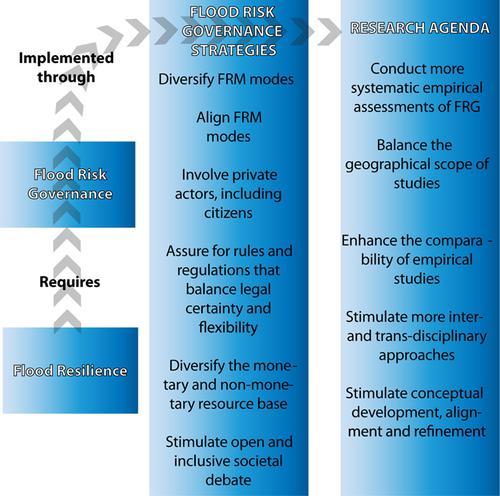当前位置:
X-MOL 学术
›
WIREs Water
›
论文详情
Our official English website, www.x-mol.net, welcomes your feedback! (Note: you will need to create a separate account there.)
Improving flood resilience through governance strategies: Gauging the state of the art
WIREs Water ( IF 8.2 ) Pub Date : 2021-06-04 , DOI: 10.1002/wat2.1532 Piotr Matczak 1 , Dries Hegger 2
WIREs Water ( IF 8.2 ) Pub Date : 2021-06-04 , DOI: 10.1002/wat2.1532 Piotr Matczak 1 , Dries Hegger 2
Affiliation

|
There has been an upsurge in studies of flood risk governance (FRG): steering and decision-making by public and private actors as a complement to risk assessments and technical management options. The scholarly debate is, however, highly fragmented, complicating the production of cumulative insights. To address this knowledge gap, we used six governance strategies for achieving flood resilience that previously have been put forward as a conceptual framework to review 121 articles published between 2016 and 2019, complemented with insights contained in recent overview articles, to gauge the state-of-the-art in FRG literature: to (a) diversify flood risk management strategies; (b) align the strategies; (c) adequately involve private actors, including citizens; (d) put an adequate rule system in place; (e) cater for sufficient monetary and non-monetary resources; (f) inspire an open and inclusive normative debate. We found, first, that literature is producing insights on increasingly technically advanced risk assessments and agent-based models but societal debate on justice in flood risk governance is getting attention. A clearly emerging topic is that of citizen engagement in flood risk governance. Second, the geographical focus of the studies is still skewed toward the Global North. To make progress in understanding flood risk governance for better resilience more systematic and comparative empirical assessments of flood risk governance in order to derive generalizable lessons while better taking into account the context-specificity of FRG. Testing flood risk governance solutions against comparative cases, by balancing the geographical scope of research efforts, and enhancing interdisciplinary and transdisciplinary working is a way to deliver knowledge for more resilience.
中文翻译:

通过治理策略提高抗洪能力:衡量最先进的技术
洪水风险治理 (FRG) 研究激增:公共和私人行为者的指导和决策作为风险评估和技术管理选项的补充。然而,学术辩论高度分散,使累积见解的产生复杂化。为了解决这一知识差距,我们使用了六项治理策略来实现抗洪能力,这些策略以前作为概念框架提出,审查了 2016 年至 2019 年间发表的 121 篇文章,并辅以最近的概述文章中包含的见解,以衡量当前的状况-FRG 文献中的最新技术:(a) 使洪水风险管理策略多样化;(b) 调整战略;(c) 让包括公民在内的私人行为者充分参与;(d) 建立适当的规则系统;(e) 提供足够的货币和非货币资源;(f) 激发公开和包容性的规范辩论。我们发现,首先,文献正在对技术上越来越先进的风险评估和基于代理的模型产生见解,但关于洪水风险治理中的正义的社会辩论正在引起关注。一个明显出现的主题是公民参与洪水风险治理。其次,研究的地理重点仍然偏向于全球北方。在理解洪水风险治理以提高恢复力方面取得进展 对洪水风险治理进行更系统和比较的实证评估,以便在更好地考虑 FRG 的背景特殊性的同时得出可推广的经验教训。针对比较案例测试洪水风险治理解决方案,
更新日期:2021-06-04
中文翻译:

通过治理策略提高抗洪能力:衡量最先进的技术
洪水风险治理 (FRG) 研究激增:公共和私人行为者的指导和决策作为风险评估和技术管理选项的补充。然而,学术辩论高度分散,使累积见解的产生复杂化。为了解决这一知识差距,我们使用了六项治理策略来实现抗洪能力,这些策略以前作为概念框架提出,审查了 2016 年至 2019 年间发表的 121 篇文章,并辅以最近的概述文章中包含的见解,以衡量当前的状况-FRG 文献中的最新技术:(a) 使洪水风险管理策略多样化;(b) 调整战略;(c) 让包括公民在内的私人行为者充分参与;(d) 建立适当的规则系统;(e) 提供足够的货币和非货币资源;(f) 激发公开和包容性的规范辩论。我们发现,首先,文献正在对技术上越来越先进的风险评估和基于代理的模型产生见解,但关于洪水风险治理中的正义的社会辩论正在引起关注。一个明显出现的主题是公民参与洪水风险治理。其次,研究的地理重点仍然偏向于全球北方。在理解洪水风险治理以提高恢复力方面取得进展 对洪水风险治理进行更系统和比较的实证评估,以便在更好地考虑 FRG 的背景特殊性的同时得出可推广的经验教训。针对比较案例测试洪水风险治理解决方案,


























 京公网安备 11010802027423号
京公网安备 11010802027423号